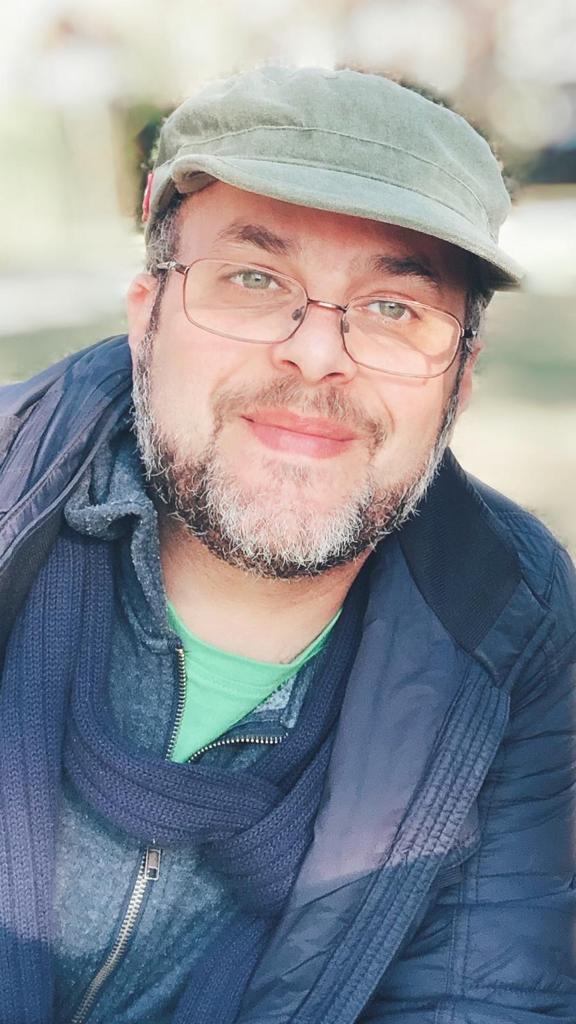Hani Abbas is a well-known cartoonist, living in Switzerland since 2012 after fleeing the war in Syria where he now works at the Freedom Cartoonists Foundation. As a Syrian and Palestinian living all his life as a refugee, his artworks reflect his history. The images he created for the first NFT sale with UNHCR were called “Windows”, as open windows to see and represent the effects of war on people.
For the World Press Freedom Day 2022 and in light of the Cartooning for Peace exhibition at the Quai Gustave Ador in Geneva until 31 May, we have interviewed this ambassador of Free Press, who was forced to flee because of his art.

Hani Abbas, please briefly introduce yourself:
I’m a Syrian-Palestinian cartoonist. I was born and grew up in Yarmouk, a Palestinian refugee camp in the southern suburbs of the Syrian capital Damascus. I arrived in Switzerland in 2012, fleeing the Syrian conflict with my family.
My works can be seen in Le Temps and La Liberté in Switzerland, and France’s Le Monde. I am proud to be a member of the Cartooning for Peace organization, a network of press cartoonists committed to promoting freedom and democracy.
In 2014, I received the International Editorial Cartoon Prize in Geneva.
Drawing is at the center of your life. It has opened doors to you, but it seems that it has also led you to a few challenges. What is your relationship to cartooning?
I loved drawing when I was a child and I always preferred drawing over other activities. My father was a painter and had a lot of colouring materials ... Since that time, drawing and colours have become my personality and passion.
As I started getting out of childhood, political and social awareness began to affect who I was, as well as my paintings. That was the start of caricature for me. The wonderful mixture between art and the national and humanitarian message and ideas created a sort of “crazy art”. You could say everything using simple lines. To find those simple and impactful lines was also the challenge.
Later, the strong influence of cartoons made it the most dangerous of arts. And, of course, I faced many problems because of that. I was lucky to have been able to leave Syria after two years of revolution and war. In some areas, you cannot express your opinion easily and many lost their lives because of that.
Frankly, the most beautiful thing about cartoons is the feeling of challenge and the great energy that a cartoonist possesses.
In 2014, you won the International Editorial Cartoons Prize. What did this mean to you?
It was definitly a great moment for me. I didn't expect to get such an important award in my life. It was amazing !
This prize gave me a lot of energy to continue and reinforced my view that freedom of expression is a precious thing that must be preserved. I was happy because someone cared about that.
Last year, you created the first-ever NFT for refugees, an initiative led by you, also a former refugee. How does cartooning help make the world a better place?
The idea of art being supportive of humanitarian causes is important not only in sending messages. There is also a potential for concrete support through the sale of paintings for the benefit of people in need of support. This is important and inspiring.
Digital currency is a new and rapidly circulating type, and the idea of Switzerland for UNHCR’s team was pioneered by using digital currencies to support refugees. I'm proud to be part of this amazing effort.
This last question, is another example of a refugee supporting other refugees. What can the public at large do to support people forced to flee, namely in Switzerland?
It is not easy for someone to leave his country, the place where he was born and lived, and where his life had a foundation... People leave their countries against their will, and there are many reasons to do so. The most difficult of these reasons is war.
While bodies leave the country, the memories remain there... When arriving in a new place, hurdles resume. But as refugees, we must be strong for the sake of our children and for what we love.
In Switzerland, I found a lot of support and attention, and I always pray that all refugees receive support. All countries are beautiful when we come to them as visitors, but it becomes difficult when we come as refugees. A new place, a new language, a relatively different culture. A lot of things make this a challenging experience.
When we work together, we can erase the difficulties.